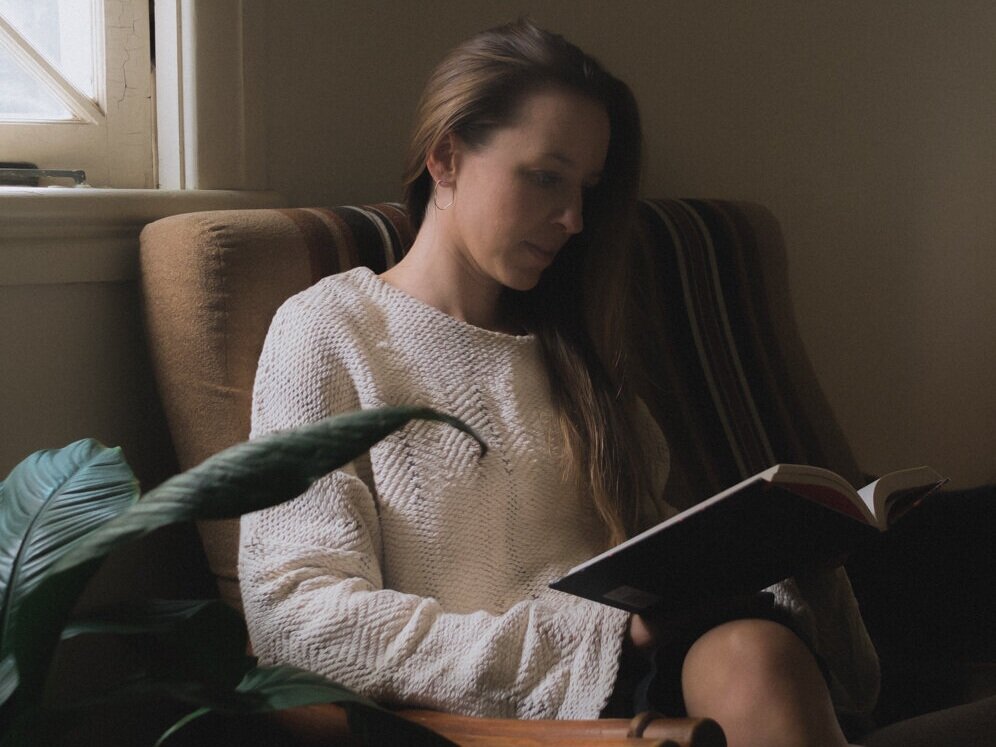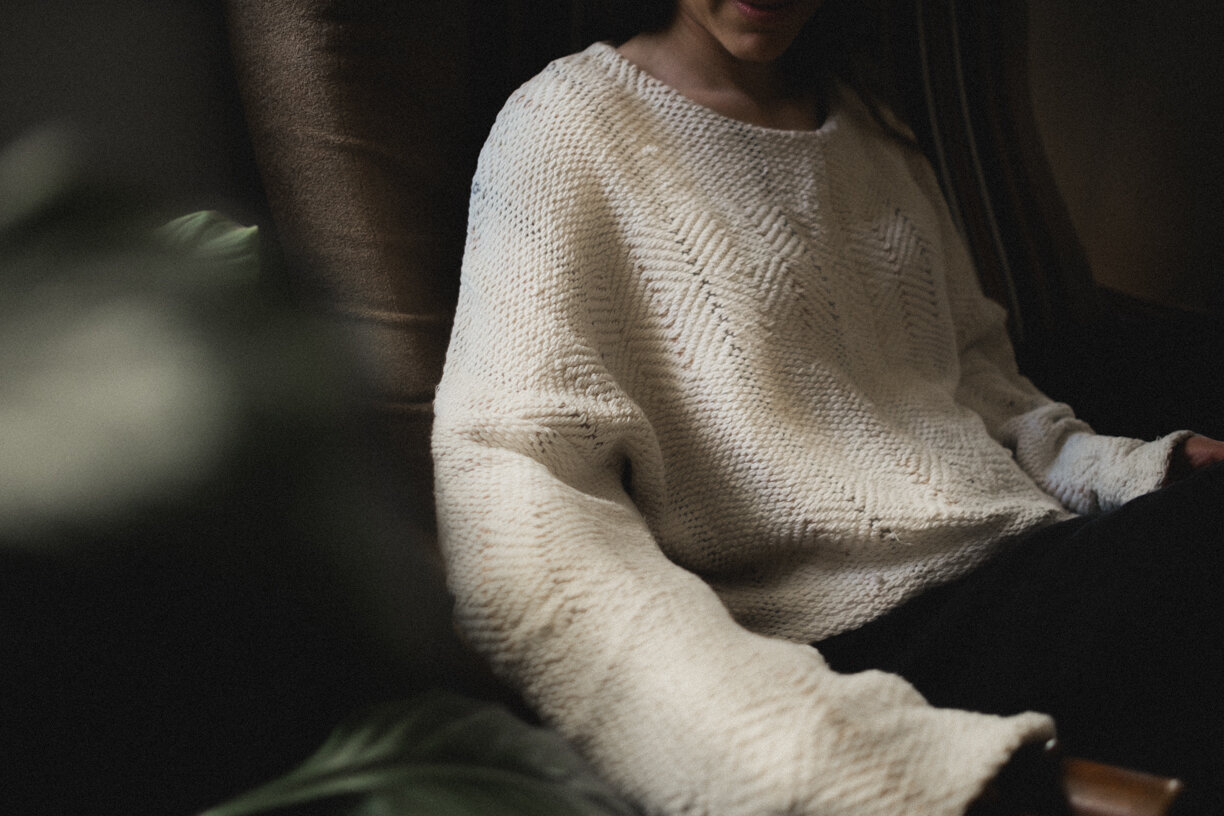Bringing artisan-made fashion to the world, with RŪPAHAUS
Getting a jumper hug in my artisan-made RŪPAHAUS knit. I found this sister-run label at The Finders Keepers markets. Image by Jam Banks for Shift
Have you ever dug deeper into the fashion world and discovered how many layers there are in a traditional supply chain? There can be so very many, with different factories producing different elements of even just one garment.
When I met Steph and Addie, the two sisters behind Australian-Indonesian label RŪPAHAUS, I was so refreshed to learn about their business model: they meet and work directly with the artisans who hand-make, sew and weave their garments and home decor, meaning they cut out potentially multiple layers of middle-men.
Not only are they cutting out these (often corrupt and exploitative) middle-people, but these savvy and determined sisters are working with local Indonesian artisans to preserve their traditional crafts and share the output of those skills with the world.
I caught up with Addie, one half of the sister duo behind RŪPAHAUS, to find out more about how the brand began, and where it’s headed - including their ambitions to be a zero-waste label!
How did you get into the fashion industry and to launching your own label - was it fashion itself that drove you, or did you want to work with artisans and their traditional craft?
To be in the fashion industry never came across my mind when I had the idea to start RŪPAHAUS. It all began as a personal interest in textiles and traditional craftsmanship, and the opportunity only arose in 2016 when I’d worked in various fashion brands and seen first-hand how selfish the fashion industry really works. The idea of supporting what the fashion industry is really doing to the environment didn’t sit well with me and I knew if I were to start my own [label] I would take a complete different approach to it. So after calling Berlin my second home for 8 years, I made a sudden decision and finally decided to go home to Perth and bring my dream to life.
“Growing up as an Indonesian, my appreciation for traditional craftsmanship has been embedded in the complexity of Indonesian culture and traditions.”
The initial goal for RŪPAHAUS was to create a bridging platform for the artisans to get world recognition for their traditional skills.
But I also wanted to incorporate social aspects such as putting local resources into creating the products, while providing a medium for the traditional textiles to evolve together with time, in the hope to sustain the dying art of creating textiles as well as the artisans’ vocations in Indonesia. It was also important to me to educate them to care for the environment they’re surrounded with through ethical processes and responsibly-sourced materials, all while promoting the local economy and preserving tradition.
The collaborative operation behind RŪPAHAUS runs under the motto “interlacing tradition into stories’’ and with it, we want to highlight the artisans and set their stories as the focus of the brand. By approaching it through a different perspective, we can still create ethically handmade products full of meaning but also rebuild the beautiful communities of artisan collectives and be kind to the environment we’re surrounded with.
RŪPAHAUS work directly with Indonesian artisans, cutting out the middle-men and preserving traditional crafts. Image via RŪPAHAUS.
Why do you think it's so important to pair traditional, native crafts with our modern lifestyle and aesthetic?
In my perspective, traditions need to evolve with time in order to be sustained and preserved. But that becomes tricky when the possibility for it to evolve is not available, due to lack of informative education or inappropriate approaches, like manufacturing for wholesalers.
“The collaborative concept within RŪPAHAUS allows us to explore the limits and discover innovative approaches through experimenting.”
For us, it is crucial to have a real understanding between the team behind RŪPAHAUS and the partner artisans in our mutual learning process so we can work symbiotically, because only then can we create possibilities that are tailored to each community. In today’s society it is important for us to be reminded and educated of our heritage and how we can preserve it for the next generations to come.
You work directly with artisans, cutting out the middle-men in the garment supply chain. What were the challenges in approaching your business this way, and why do you think it's an important part of your process - what are the rewards?
Honesty is the best policy! I truly believe in it because this was always the approach we took to get to know each and every potential partner artisan we have discovered along the way. There are just too many intermediaries that are earning way too much money for a skill they don’t own and too many artisans got exploited through that - seeing that just saddened me.
“Most middle-men don’t like us when they know we exist, but simultaneously, they can’t control us or the artisans because these artisans are their own entities.”
One of our challenges is probably earning the trust of the artisans and making them understand why we do things differently, because many of them still rely on the middle-men a little too much, which blinds them from seeing how they are really treated. But all of this hard work pays off when you see what you can bring to the table for them in return.
I am speechless when it comes to rewards, because the genuine gratitude and pride you’ll receive from the artisans will only make you smile through the week and give you nothing but a warm heart, knowing that you’re contributing to bringing honour back into their lives. That’s when you know you have done the right thing.
I have grown so much both spiritually and intellectually since I have started this brand, because everything about it is a learning process. Through it I’ve learned to appreciate simple things in life that really matter, and to get to experience the sincerity of generosity in life through everyone and everything I have encountered along the path is a priceless gift I would never trade for anything.
Plus speaking the national language (bahasa) is definitely a plus in this department!
Do you have advice on ways other brands can make their operations more ethical and sustainable - or even regenerative in the industry?
Creating something beautiful that is ethically and sustainably made is always going to be a challenge, but it is definitely not impossible to tackle. I think it really comes down to what your values and priorities are, but for us we have reached a turning point where we simply can’t afford to ignore; each and every one of us is contributing to shaping our future world and society, and if we don’t take actions now, when are we going to start?
My recommendation would be to start with small actions - let it be less waste, recycling your waste by converting it into other products, or limit your production quantity - but set it with intention and you will slowly progress onto bigger things.
What's next for RUPAHAUS?
As much as we have integrated sustainable practices into all aspects of RŪPAHAUS, we are yet to be a zero-waste brand. Our aim is still to turn our operation into a complete circular system by maximising our upcycling, and purposefully reclaim our waste into beautiful articles. So stay tuned and keep your eyes peeled, because beautiful things are coming your way!
Me in my artisan-made RUPAHAUS jumper, relishing some slow time at home. Image by Jam Banks for Shift



